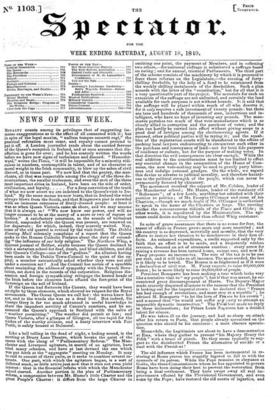Like a bell tolling in the dead of night, a
boding sound, is the meeting at Drury Lane Theatre, which breaks the quiet of the recess with the clang of "Parliamentary Reform." The Man- chester and Liverpool agitators, in search of an agitation, have tried many schemes, and have at last devised the one which was put forth at the " aggregate " meeting on Monday. It may be said to consist of three parts, as it seeks to combine several in- terests. One part, with which the agitators began, is a sort of deferred stock, so little active just pow that it does not even yield interest : that is the financial reform with which the Manchester school started. Another portion is the plan of Parliamentary reform, a compromise between Mr. Hume is little Charter and the great People's Charter : it differs from the large Charter in
omitting one point, the payment of Members, and in softening' two others,—for universal suffrage is substituted a suffrage based on rating ; and for annual, triennial Parliaments. The third part of the scheme consists of the machinery by which it is proposed to force these reforms on the Legislature,—the creation of forty. shilling freeholds, by the help of a fund to be reimbursed from the weekly shilling instalments of the freeholders. Such a plan accords with the letter of the "constitution," but for all that it is a very questionable part of the project. The materials for such an extension of the suffrage are not unlimited, and certainly the land available for such purposes is not without bounds. It is said that the suffrage will be placed within reach of all who deserve it, for it only requires a safe investment of twenty pounds: but there are tens and hundreds of thousands of men, industrious and in- telligent, who have no hope of investing any pounds. The man- oeuvre partakes too much of that vote-manufacture which is so closely allied to corruption and the purchase of votes; and the plan can hardly be carried into effect without giving scope to a good deal of intrigue among the electioneering agents. If it succeed, other political parties will be trying it ; and the squab- bles of the registration courts will be transferred to the offices of pushing local lawyers endeavouring to circumvent each other in the purchase and conveyance of land—not for bond fide purposes of residence or culture, but for the purpose of making votes. In that direction the evil consequences are clear enough. While the real addition to the constituencies must be too limited to effect any essential change in the composition of the House of Com- mons, the new vote-making may be used to gratify party bitter- ness and indulge personal grudges. On the whole, we regard this device as adverse to political morality, and therefore hazard- ous to the political strength of the people, which can never be permanently fostered by chicanery. The movement received the support of Mr. Cobden, leader of the Manchester school ; Mr. Hutne, leader of the residuary old "Reformers"; of a few Lords, anything but setisiled with their position in politics ; of Mr. Feargus O'Connor and some, of his Chartists,—though we much doubt if Mr. OlConnor is authorized tar, speak in the name of the Chartists at large. The meeting -excite-6- the consentaneous ridicule of the Times and Globe ; in other words, it is repudiated by the Ministerialists. The agi- tators could desire nothing better than official Whig resistance.


























